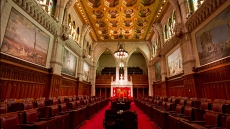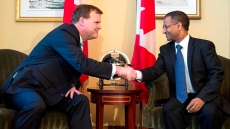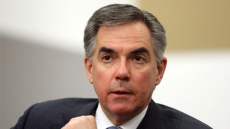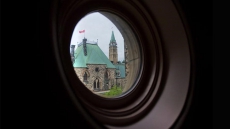TORONTO - Canada is following in Australia's footsteps and has suspended, effectively immediately, the issuance of visas to residents of the West African countries battling Ebola.
In a move that puts Canada at odds with the World Health Organization, the federal government said Friday it is suspending visa applications for residents and nationals of countries with "widespread and persistent-intense transmission" of Ebola virus disease.
That stress on countries with widespread transmission provides an out for the United States, which currently still has at least one active Ebola case within its borders.
The federal government said it would stop issuing visas in the worker, student or visitor class and won't issue any pending permanent residency visas for people from those countries either. Any applications already in the system will also not be processed at this time. The change, which goes into effect immediately, was announced Friday in the Canada Gazette.
Kevin Menard, spokesperson for Chris Alexander, minister of citizenship and immigration, said the move is similar to but a bit less restrictive than the one the Australian government announced this week.
Australia's move was slammed Wednesday by Dr. Margaret Chan, the director general of the World Health Organization, who said closing borders will not stop spread of the Ebola virus.
David Fidler, an international law professor at Indiana University, said the moves by Canada and Australia place both countries in violation of the International Health Regulations, a treaty to which both are signatories.
The IHR, as they are called, are designed to help the world fight infectious disease outbreaks that have the potential for international spread. They were revised and strengthened in 2005 in the wake of the 2003 SARS outbreak.
During SARS, the World Health Organization issued travel advisories directing people around the world to avoid places battling severe outbreaks. It is a tool the organization has not used since.
One of the places hit with a travel advisory was Toronto. Ontario's then health minister, Tony Clement — now president of the federal treasury board — was among those incensed by the WHO's move. Clement led a delegation to Geneva to successfully demand the WHO rescind the travel advisory against Toronto.
Under the IHR, countries agree not to restrict trade or travel over and above what is recommended by the WHO during Public Health Emergencies of International Concern, known as a PHEIC. The WHO declared Ebola a PHEIC on Aug. 8 and in doing so said countries should not close their borders to the West African countries struggling with Ebola.
It has repeated that advice several times since.
The IHR stipulate that countries that go beyond the WHO's recommendations have to back up their decisions with solid rationale.
"You have to explain yourself. And you have to show that your measure, which is more restrictive than what WHO is recommending, is based in science and public health principles," Fidler said in an interview.
"There isn't a public health or scientific justification for what Australia and Canada are doing. Therefore they are in violation of their obligations under the international health regulations."
The latest figures from the WHO suggest at least 13,567 people have been infected since this Ebola outbreak began, and 4,951 have died. The only nations which currently meet the definition of countries with widespread and persistent, intense transmission are Guinea, Sierra Leone and Liberia.





